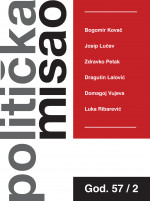Političkoekonomske marginalije o recepciji Marxa u XXI. stoljeću (u povodu čitanja knjige Daga Strpića Robna proizvodnja i udruženi rad u Marxovoj kritici političke ekonomije)
Political-economic Marginalia on the Reception of Marx in the 21st Century
Author(s): Bogomir KovačSubject(s): Marxist economics, Political Philosophy, Marxism, Government/Political systems, Political economy
Published by: Fakultet političkih znanosti u Zagrebu
Keywords: Capitalism; Commodity Production; Critique of Political Economy; Eco-Socialism; Marx; Strpić;
Summary/Abstract: In Strpić’s book on Marx’s critique of political economy, the analysis of political and economic reception of Marx serves as starting point for the author’s assignment of contemporary position and relevance of Marx’s analysis. Both actualization and return to Marx always occur in the times of crisis, therefore his intellectual fate depends on changes within contemporary capitalism and its alternatives. In Marx’s analysis, the paradox of theoretical incompleteness stems from his aim for ideal epistemology of capitalism, which is also present in later Marxist interpretations, even Strpić’s. The contemporary problem of Marx lies in the metaphysics of theory of value and in the whole structure of commodity production, which prevents ontological transition of value, capital and capitalism. His approach is physiocratic more than it is pecuniary, and more economic than it is political. This is why Jacques Bidet’s reconstruction of Marx in the terms of modernity is based on “metastructure”, which is a universal politically legal point that is not present within Marx’s critique of political economy. Such a different approach presupposes understanding capitalism as inherently a political project. As it is proven by the author, political capitalism is not a special form of capitalism, nor it is historically connected with contemporary capitalism of the 21st century (in China and elsewhere), but is moreover its universal historical form. Marx’s critique of political economy turns out to be contemporary precisely at this overlooked point of his analysis. Political capitalism as “capitalism in general” demonstrates its relevance in the analysis of contemporary crises, which are not just politicaleconomic, but also ecological and even pandemic. In a series of crises of political capitalism we are faced with a choice between real autocratic “barbaric capitalism” and more utopic “cosmopolitan” eco-socialism.
Journal: Politička Misao
- Issue Year: LVII/2020
- Issue No: 02
- Page Range: 13-30
- Page Count: 18
- Language: Croatian

